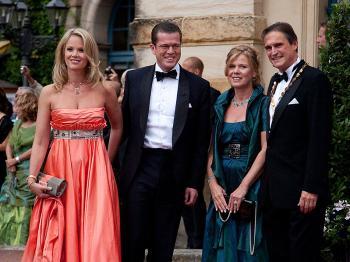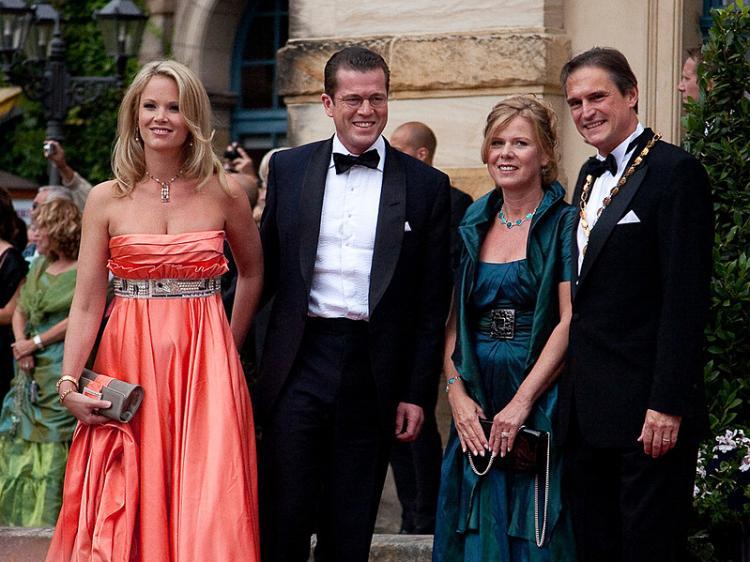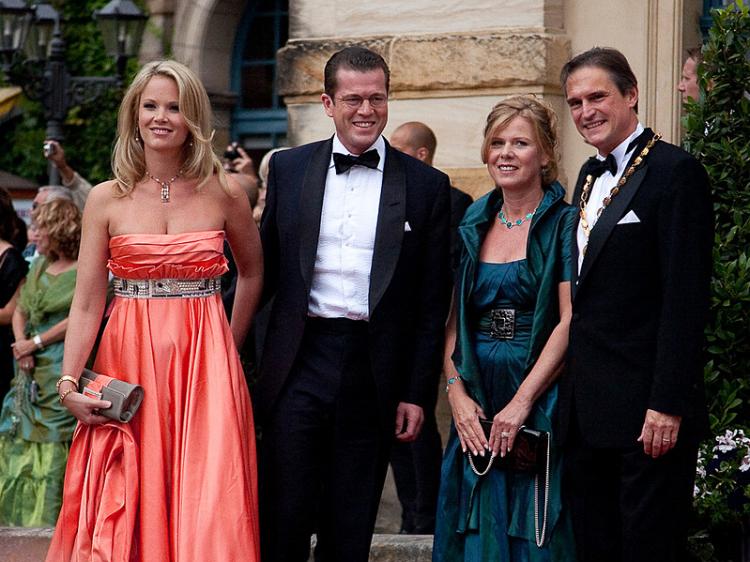BAYREUTH, Germany—When you suddenly encounter the British Minster of Culture at the train station at noon wearing flip-flops, Bermuda shorts, and a beige-green Hawaiian shirt—though when you asked him the night before for the interview, he was wearing a tuxedo—then you know this must be Bayreuth.
Bayreuth, in retrospect, must not have been a place, but a state of mind. People ask me, “How was Bayreuth?” And my reply, “Well, simply Bayreuth,” and everyone knows what I mean.
And for the daughters of the legendary Wolfgang Wagner, the ladies Katharina Wagner and Eva Wagner-Pasquier, this was not the first time they assumed responsibility for the overall production—but, for me, last Saturday was “my first Bayreuth.”
It is true that each premiere has its own magic. Bayreuth breathes classic opera, in spite of all the (justified) critique for the overly modern presentation of Tristan and Isolde.
No one put it better than Margot Werner: “Tristan in a bed at a mental institution—I don’t want to see this.” She put into words the feelings of many who, for personal reasons or diplomatic considerations, were not as blunt.
Then there was Karl-Theodor zu Guttenberg who officially toppled Angela Merkel from her position as most-beloved German politician that weekend. Perhaps “toppled” is too strong; rather, he charmed his way into this No. 1 slot. For him it was a controversial production, but a soul-stirring one.
Could be a description he reserves for himself. His family has for generations cultivated an aura of independence, something still very much with the minister, in spite of his party affiliation.
And then something happens that makes people aware of what it is that makes the 37-year-old Guttenberg a shining star on Germany’s political firmament. The formal reception in the festival tent at the New Chateau Bayreuth is crowded, and Guttenberg is indeed fabulously good looking. His wife Stephanie, however, is uncomfortable with the shindig. Outsiders would scarcely notice, but Guttenberg notices.
Following a brief eye contact between them, Guttenberg suggests, “Lets go outside for a minute, it is cooler out there.” And so Germany’s political pop-star couple disappear, while the other political greats like Edmund Stoiber, Horst Seehofer and Angela Merkel relish the stage lights and make themselves available to the guests and journalists.
I follow the Guttenbergs and notice that a group of Chinese students accost them in the half dark and beg for a photo opportunity and autographs. But I hear no political slogans, merely a short dialogue absent of all pretense—something rare among politicians because it sounds sincere—perhaps even a bit bashful. How suitable—considering the youth of this family man and father of two in whom Germany sets so much hope. And the dialogue happened at eye level, even though the Chinese were not tall.
What a contrast to his colleague Seehofer, who later on will deal with the same group of students in the self-important manner of the statesman as if he were campaigning for an upcoming election—and, of course, do so in the main festival tent.
That is where the Guttenbergs return to and chat with tuxedo-clad British Culture Minister Ben Bradshaw, the chap I had encountered at the train station wearing flip flops ... While I am writing this, I almost drop my laptop recalling the train station encounter and his not-so-prudish Bermudas; here he characterizes the opera production as an accomplished act of 1950s prudery.
This former BBC correspondent in Berlin (of course I speak German), easily taken as Hugh Grant’s twin brother, is an equal with the Guttenbergs. Birds of a feather flock together. Stephanie Guttenberg seems to have a good time now, too.
The pair holds only a brief conversation with Angela Merkel; she is one of the first politicians to leave the formal reception. It is my first time being in such close proximity to the chancellor who emits an aura of state responsibility and commitment. She shoulders the nation gladly, and the weight of her office clearly rests on her shoulders. This woman takes her job seriously—a lasting impression.
And Bayreuth also leaves me with a lasting impression. Which? Well, simply Bayreuth.
Bayreuth, in retrospect, must not have been a place, but a state of mind. People ask me, “How was Bayreuth?” And my reply, “Well, simply Bayreuth,” and everyone knows what I mean.
And for the daughters of the legendary Wolfgang Wagner, the ladies Katharina Wagner and Eva Wagner-Pasquier, this was not the first time they assumed responsibility for the overall production—but, for me, last Saturday was “my first Bayreuth.”
It is true that each premiere has its own magic. Bayreuth breathes classic opera, in spite of all the (justified) critique for the overly modern presentation of Tristan and Isolde.
No one put it better than Margot Werner: “Tristan in a bed at a mental institution—I don’t want to see this.” She put into words the feelings of many who, for personal reasons or diplomatic considerations, were not as blunt.
Then there was Karl-Theodor zu Guttenberg who officially toppled Angela Merkel from her position as most-beloved German politician that weekend. Perhaps “toppled” is too strong; rather, he charmed his way into this No. 1 slot. For him it was a controversial production, but a soul-stirring one.
Could be a description he reserves for himself. His family has for generations cultivated an aura of independence, something still very much with the minister, in spite of his party affiliation.
And then something happens that makes people aware of what it is that makes the 37-year-old Guttenberg a shining star on Germany’s political firmament. The formal reception in the festival tent at the New Chateau Bayreuth is crowded, and Guttenberg is indeed fabulously good looking. His wife Stephanie, however, is uncomfortable with the shindig. Outsiders would scarcely notice, but Guttenberg notices.
Following a brief eye contact between them, Guttenberg suggests, “Lets go outside for a minute, it is cooler out there.” And so Germany’s political pop-star couple disappear, while the other political greats like Edmund Stoiber, Horst Seehofer and Angela Merkel relish the stage lights and make themselves available to the guests and journalists.
I follow the Guttenbergs and notice that a group of Chinese students accost them in the half dark and beg for a photo opportunity and autographs. But I hear no political slogans, merely a short dialogue absent of all pretense—something rare among politicians because it sounds sincere—perhaps even a bit bashful. How suitable—considering the youth of this family man and father of two in whom Germany sets so much hope. And the dialogue happened at eye level, even though the Chinese were not tall.
What a contrast to his colleague Seehofer, who later on will deal with the same group of students in the self-important manner of the statesman as if he were campaigning for an upcoming election—and, of course, do so in the main festival tent.
That is where the Guttenbergs return to and chat with tuxedo-clad British Culture Minister Ben Bradshaw, the chap I had encountered at the train station wearing flip flops ... While I am writing this, I almost drop my laptop recalling the train station encounter and his not-so-prudish Bermudas; here he characterizes the opera production as an accomplished act of 1950s prudery.
This former BBC correspondent in Berlin (of course I speak German), easily taken as Hugh Grant’s twin brother, is an equal with the Guttenbergs. Birds of a feather flock together. Stephanie Guttenberg seems to have a good time now, too.
The pair holds only a brief conversation with Angela Merkel; she is one of the first politicians to leave the formal reception. It is my first time being in such close proximity to the chancellor who emits an aura of state responsibility and commitment. She shoulders the nation gladly, and the weight of her office clearly rests on her shoulders. This woman takes her job seriously—a lasting impression.
And Bayreuth also leaves me with a lasting impression. Which? Well, simply Bayreuth.







